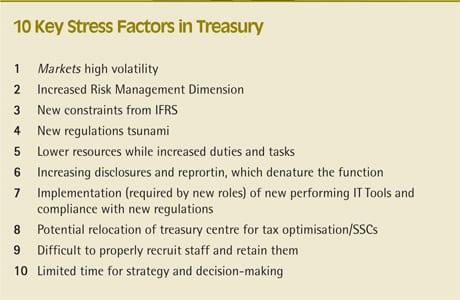
by François Masquelier, Head of Corporate Finance and Treasury, RTL Group, and Honorary Chairman of the European Association of Corporate Treasurers
Is the treasurer’s job stressful?
In Forbes magazine’s annual survey of the most stressful jobs, the treasurer’s job has never figured in the top ten. When we think of the most stressful jobs, on the face of it the treasurer’s job does not look to be one of the most stressful. However, if we look at it more closely, nobody would dare dispute the (potential) stress aspect of the job. Treasurers handle millions and billions in multiple currencies to the point of losing sight of their economic reality at times. These are no more than lines of figures and zeros, but they represent astronomical sums, and therefore huge financial and operational risks. Treasurers are also responsible for generating the highest risk-free returns possible, while ensuring there is enough liquidity, minimising cash lying idle here and there and guaranteeing compliance and adherence to ever more numerous regulations, which increases their stress. Does stress stop treasurers sleeping properly at nights? Surely not. After spending the day counting cash and keeping down risks, they can go to sleep peacefully counting sheep.

The treasury function has become much more complex over the last few years
As the challenges and the plans on their ‘to do’ lists have become ever more numerous, as the work has become more complex and the economic environment is increasingly thrown into turmoil, you can easily see why their stress levels would rise. Treasurers have been in the limelight for the last five years and this sudden popularity with CFOs and audit committees has added an extra layer of stress that was not there before. Treasurers have not been used to that much attention and to being centre stage. They accepted this somewhat reluctantly, aware of the weight of the responsibilities falling upon them. Today, treasurers’ lives are far from being a primrose path; they are more like a steep and thorny way. Treasurers have therefore had to learn how to manage this new and additional stress. They must be approaching the top ten, surely? Could this stress perhaps lead to the risk of burn-out? Maybe. BOS (Burn-Out Syndrome) was discovered by Harold Bradley in 1969 and is often found in overworked senior managers. It is a state of exhaustion and loss of motivation brought about by work, particularly when best efforts have not produced the desired results.
In treasury, loss of motivation would not come from the work, which is increasingly interesting, but potentially from the quantity of figures to be delivered with scarce resources. Exhaustion, fatigue, headaches and insomnia – these are only some of many syndromes of this state. Burn-out involves wearing yourself down, tiring yourself out and snapping because of excessive demands. This is a bit like a candle which, after burning for several hours, now gives out only a weak light. We need to be realistic and accept that this syndrome lies in wait for quite a few treasurers.
If you have been driving at 180 km/h for a long time, you end up forgetting that the legal limit is 130 km/h in European countries. Treasurers have to a certain extent forgotten what ‘normality’ and cruising speed are, since their daily lives are so busy and will stay that way with the number of new regulations and further IFRS standards. Treasurers are not going to take their foot off the accelerator and go back to their (long-lost) cruising speed any time soon. So what other choices are there?
Having started out at this speed and having become used to it, there are not many opportunities to ask yourself fundamental and existentialist questions. It may, of course, be better that way.
Take care not to burn out!
This inevitable stress and this unreasonable work overload are undoubted facts. As always, some people handle this better than others. Experienced treasurers will have built up their resistance, and will be forearmed against the risk of breakdown. To guard against this, we need to keep a cool head and soldier on in spite of the pressures and lack of resources, a sign of the times in these days of economies. Treasurers are experienced risk managers. Are they, however, also good at managing the risk of burn-out? Quite likely not![[[PAGE]]]
One of the difficulties of their job arises from having to provide an ever greater volume of information, and also from the increasing need for compliance and strengthening internal controls. This, unfortunately, is an unstoppable trend towards computerisation and rampant internationalisation.
To manage stress properly, you need excellent organisation combined with well-developed soft skills. Many treasurers often are – and always will be – hyper-technicians who ignore non-technical skills, which are nevertheless crucial to fulfilling their difficult role. Don’t hesitate to go in for a bit of yoga, life coaching, relaxation training, tai chi or anything you like provided it brings you fulfilment and a ‘zen’ attitude.
A shelter from the storm (Bob Dylan)
Treasurers have been this shelter from the storm, the guardians of liquidity and the masters of financial risk management. In spite of themselves, their role has of course been crucial during the financial crisis. They have appeared in the limelight and CFOs have understood the key protection and prevention role that they have been able to play in the storm. And here is one on which the crisis has had a beneficial effect. This role of guardian of liquidity and protector from financial risks, with all its associated contributions, will not diminish over the next few years. Quite the opposite: this function will keep on changing and evolving.
Stress will not go away. Rushes of adrenalin will be felt quite often. Don’t ever expect things to be routine. There will be a plethora of new projects. Young treasurers can never be hardened enough against the risks associated with a wonderful and changing profession, but a profession which is stressful because of the challenges toward which it must strive. The next three years are going to be interesting. In 2016, the Olympic Games will be held in Brazil. Treasurers, following the example of athletes, will have to maintain Olympic fitness to withstand and prepare for the fresh technical, technological, accounting – and economic – challenges.










